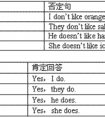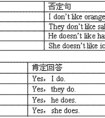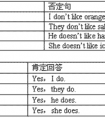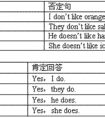句型转换。1. Theywantsomepop. (改为一般疑问句)___________________________________________2. Thisisabasketball. (变为一般疑问句)______________________________-五年级英语
题文
| 句型转换。 |
| 1. They want some pop. (改为一般疑问句) ___________________________________________ 2. This is a basketball. (变为一般疑问句) ___________________________________________ 3. Do you like this skirt? (做肯定回答) ___________________________________________ 4. Jump on the train. (改为否定句) ___________________________________________ 5. Danny is sleeping. (改为否定句) ___________________________________________ |
答案
| 1. Do they want any pop? 2. Is this a basketball? 3. Yes, I do. 4. Don't jump on the train. 5. Danny is not sleeping. |
据专家权威分析,试题“句型转换。1. Theywantsomepop. (改为一般疑问句)____________..”主要考查你对 不定代词,副词,系动词,助动词,一般疑问句 等考点的理解。关于这些考点的“档案”如下:
不定代词副词系动词助动词一般疑问句
考点名称:不定代词
- 不定代词:
不指名代替任何特定名词或形容词的代词,来表示不确定的人、事物或数量。
主要有:all,each,every,both,either,neither,one,none,little,few,many,much,other,another, some,any,no 一般不定代词用法举例:
1.some 一些,某些,某个
不定代词some可以代替名词和形容词,常用在肯定句中作主语、宾语、定语等。作定语时,它可以修饰可数名词(单、复数皆可)和不可数名词。例如:
some are doctors,some are nurses.有些人是医生,有些人是护士。(作主语)
2.any一些,任何
不定代词any可以代替名词和形容词,常用在否定句或疑问句中作主语、宾语、定语等。作定语时,它可以修饰可数名词(多为复数)和不可数名词。例如:
there isn’t any ink in my pen.我的钢笔没有墨水。(作定语)
不定代词any有时也可以用在肯定句中,表示"任何的"。例如:
you may come at any time;i’ll be home the whole day.你任何时候来都行,我整天都将呆在家里 。
不定代词any也可以用作副词,做状语,表示程度。例如:
is he any better today?他今天好一点了吗?
3.all 全体,所有(指三者以上)
不定代词all在句中可以作主语、宾语、表语、定语或同位语。
它可以代表或修饰可数名词和不可数名词。
代表或修饰可数名词时,指两个以上的人或物。
作先行词时,引导词用that。例如:
all were present at the meeting.全都到会了。(作主语,代表可数名词)
4.both 全部,都
不定代词both指两个人或事物。和all一样,可以用作主语、宾语、定语或同位语。例如:
we invited both to come to our farm.我们邀请两个人都来我们的农场?(作宾语)
5.none 无人或无
不定代词none的含义和all物相反,和no one,not any同义,但其用法相当于名词,在句子中一般作主语或宾语。
它代替不可数名词作主语时,谓语动词用单数形式;代替可数名词作主语时,谓语动词用单、复数皆可。例如:
none of the problems is /are easy to solve.这些问题没有一个是容易解决的。(作主语, 代替可数名词)
6.either 两者之中的任何一个,这个或那个。
不定代词 either 可以作主语、宾语和定语。例如:
either of them will agree to this arrangent.他们两人中会有人同意这样的安排的。(作主语)
7.neither 两者都不
不定代词 neither 是 either 的否定形式,可以作主语、宾语和定语。例如:
neither is interesting.两个都没有趣。(作主语)
8.each 每个,各自的
不定代词each指每一个人或事物的个别情况,甚至指这些个别情况各不相同。
它在句中可以作主语、宾语、定语和同位语。例如:
she gave the children two apples each.她给了每个小孩两个苹果。(作the children的同位语。)
9.every 每个,每一的,一切的
不定代词every有"全体"的意思,和all的意义相近,但只能作定语。- some和any的用法比较:
some和any均可代替名词和形容词,作定语时,它所修饰的名词既可以是可数名词,也可以是不可数名词。
some一般用于肯定句或肯定形式的答语中,any一般用于否定句或疑问句中否定形式的答语中。
例:There are some birds in the tree. 树上有一些鸟。
There is some bread in the dish. 盘子里有一些面包。
— Do you have any story-books? 你有故事书吗?
— Yes, I have some. 是的,我有。
— No, I don’t have any. 不,我没有。
no 用在肯定句中表示否定的意思。
例:There are no letters for you today. 今天没有你的信。
考点名称:副词
- 副词:
用来修饰动词、形容词、其他副词或全句的词,表示时间、地点、程度、方式等。 - 分 类:
1) 时间和频度副词:
now,then,often,always,usually,early,today, lately, next,last,already,generally,frequently, seldom,ever,never,yet,soon,too, immediately, hardly,finally,shortly, before, ago,sometimes, yesterday.
2) 地点副词:
here, there, everywhere, anywhere, in, out, inside, outside, above, below, down, back, forward, home, upstairs, downstairs, across, along, round , around, near, off, past, up, away, on.
3) 方式副词:
carefully, properly, anxiously, suddenly, normally, fast, well, calmly, politely, proudly, softly, warmly
4) 程度副词:
much,little, very,rather,so,too,still, quite, perfectly, enough, extremely, entirely,almost, slightly.
5) 疑问副词:
how, when, where, why.
6) 关系副词:
when, where, why.
7) 连接副词:
how, when, where, why, whether. 副词的位置:
A、副词修饰动词(包括动名词和分词)时,通常位于被修饰动词的后面。
例:Shestudieshard.她学习努力。
B、副词修饰形容词是,通常放在该形容词的前面。
例:LiMingistooyoung.Hecan’tcarrytheheavybox. 李明太小,他搬不动这个重箱子。
C、副词修饰其他副词时,通常放在被修饰副词的前面。
例:Thegirlsingsverywell.这个女孩歌唱得非常好。副词用法:
副词在句中可作状语,表语,补语。
He works hard.
他工作努力。
You speak English quite well.
你英语讲的很好。
Is she in ?
她在家吗?
Let's be out.
让我们出去吧。
Food here is hard to get.
这儿很难弄到食物。
考点名称:系动词
- 系动词:
亦称连系动词,作为系动词,它本身有词义,但不能单独用作谓语,后边必须跟表语,亦称补语(形容词),构成系表结构说明主语的状况、性质、特征等情况。
- 最新内容
- 相关内容
- 网友推荐
- 图文推荐
| [家长教育] 孩子为什么会和父母感情疏离? (2019-07-14) |
| [教师分享] 给远方姐姐的一封信 (2018-11-07) |
| [教师分享] 伸缩门 (2018-11-07) |
| [教师分享] 回家乡 (2018-11-07) |
| [教师分享] 是风味也是人间 (2018-11-07) |
| [教师分享] 一句格言的启示 (2018-11-07) |
| [教师分享] 无规矩不成方圆 (2018-11-07) |
| [教师分享] 第十届全国教育名家论坛有感(二) (2018-11-07) |
| [教师分享] 贪玩的小狗 (2018-11-07) |
| [教师分享] 未命名文章 (2018-11-07) |






